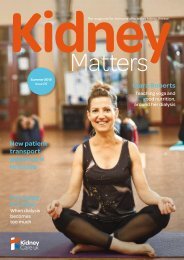Kidney Matters - Issue 9 Summer 2020
Kidney Matters is our free quarterly magazine for everyone affected by kidney disease. This issue includes some advice on keeping busy during lockdown, tips on managing your diet and weight, insight into the life of a carer, and an interview with the fabulous 'Marilyn' (front cover). As well as this the we have some delicious kidney-friendly cherry filo pastry tarts in the Kidney Kitchen and our Kidney Clinic discusses the advantages and disadvantages of prednisolone.
Kidney Matters is our free quarterly magazine for everyone affected by kidney disease.
This issue includes some advice on keeping busy during lockdown, tips on managing your diet and weight, insight into the life of a carer, and an interview with the fabulous 'Marilyn' (front cover). As well as this the we have some delicious kidney-friendly cherry filo pastry tarts in the Kidney Kitchen and our Kidney Clinic discusses the advantages and disadvantages of prednisolone.
Create successful ePaper yourself
Turn your PDF publications into a flip-book with our unique Google optimized e-Paper software.
LEARN MORE
22
Who cares for the carer?
Receiving treatment for chronic kidney disease (CKD) is a life-long commitment to some
form of renal replacement therapy (RRT). It can be an arduous journey and not many of
us travel this journey alone. The diagnosis of CKD affects everyone around us and the
impact on our partners, loved ones, and home life can never be underestimated.
It’s the little things that can affect you most when you
are a carer for someone with a chronic illness.
I work as a psychotherapeutic counsellor and am used
to supporting others. But I have learned through our
experience of CKD how the gruelling schedule of daily
care can take its toll on the carer.
Small details take over your life. The health service is
under-resourced and over-stretched, and can tend to
focus on the patient rather than the supporting ‘home
team’, who are every bit as important.
When my husband Geoff was diagnosed with CKD in
June 2016, we were initially stunned by the diagnosis.
An optician identified bleeding behind the retina and
referred him to our GP. Our GP then confirmed that
Geoff’s kidney function was down to 20%. Now we
understood Geoff’s increasing tiredness and regular
chest infections over the winter months. We limped
along until September that year when he finally had a
peritoneal catheter inserted. At this point his kidney
function was just 6%. Geoff spent his days resting on
the sofa – not in any discomfort, but quietly ‘slipping
away’ – or so it seemed.
However, the catheter insertion gave us new hope.
As I was still working, friends kindly helped transport
Geoff to and from Norfolk and Norwich hospital.
Health personnel came to assess the premises for the
automated peritoneal dialysis (APD) machine, and our
two sons lugged the massive boxes of dialysis fluid
(two bags a night) up our two flights of stairs in our tiny
thatched cottage, every evening. I spent many hours
on the phone in the middle of the night to the 24-hour
help line, and frequently slept in my workroom as the
alarms woke me up constantly. Stopping work was not
an option, as I am self-employed and we could not pay
the mortgage without the income.
We got to a point where the nurses suggested we go on
to the day-time bags instead. This at least relieved us
of the disturbed nights. But the presence of discarded
bags of dialysis fluid left around the living room during
Geoff and me
Photographs by Andy Brooke
If you are a carer and would like to talk to someone about any of the issues raised in this
article, Kidney Care UK have trained counsellors who may be able to help. Visit
www.kidneycareuk.org/counselling or call us on 01420 541424 to make an appointment
For expert advice, information and support for carers, visit Carers UK: www.carersuk.org

















